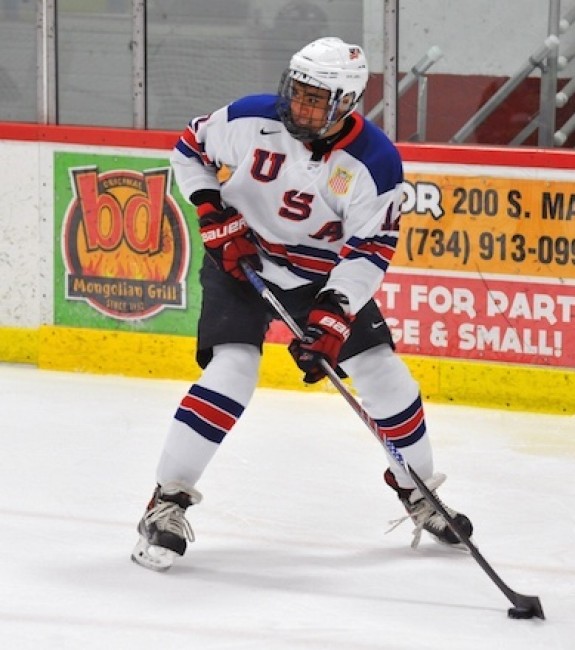Minnesota Wild prospect and Boston University junior Jordan Greenway is the first black American to represent the United States at the Olympics. A skilled and exciting hockey player, Greenway is sure to make an impact in the NHL. For now, Greenway is making history in PyeongChang. That he will be taking to the ice for his country in the same month as the NHL celebrates “Hockey is for Everyone” is a reminder of just how far the sport has to go.
From Canton to Korea
In his hometown of Canton, New York, everyone played hockey and ice rinks were all over town. Greenway put on skates at the age of three. He started developing his skills in earnest at the famous Shattuck Saint Mary’s before making the jump to the U.S. National Team Development Program.
Greenway makes his living standing in front of the net. He is a power forward, likely to spend his career screening the goaltender, deflecting shots from the perimeter and chopping home rebounds. He remains at BU, where he’s scored 82 career points and registered 182 penalty minutes in 104 games for the Terriers.
Related: Jordan Greenway – The Next Ones
It is rare for someone as big as Greenway to skate so well. He has a brisk stride and his strength and agility make it difficult for defenders to knock the puck off of him. He’s learned to use his body to his advantage in creating space around the ice. He also takes away focus from other star players, making him beneficial to any team.
A Man Among Boys
Greenway gained a lot of attention at the 2017 World Juniors. Team USA won gold with a thrilling 5–4 shootout win against Canada in Montreal. The Americans were small fast players who played with pace and pushed the action from one end of the rink to the other. While some of these players will grow an inch or two or pack on 20 pounds by the time they become NHL regulars, only three stood taller than 6-foot-1. One of those was Greenway.
Greenway is listed at 6-foot-6 and 230 pounds. When he leaves college, he’ll join the Minnesota Wild, who drafted him in the second round back in 2015.
Olympic Debut
He is one of two players from that World Junior squad to make the U.S. Olympic team for Pyeongchang. In his Olympic debut, a 3–2 loss to Slovenia, he played 15 minutes and tapped home a rebound in the second period.
Goal! ????????
Jordan Greenway scores to give #TeamUSA a 2-0 lead 12:57 into the second period. https://t.co/jwc7ArcINf pic.twitter.com/muTzUCQQeR
— Sporting News NHL (@sn_nhl) February 14, 2018
Breaking the Color Barrier
What should not escape notice is that Greenway is the first African-American ever to represent the U.S. in Olympic hockey. Black hockey players have played and even medaled in the Olympics. Jarome Iginla and P.K. Subban did it for Canada and Johnny Oduya for Sweden. Greenway is the first American. Let that sink in. For Greenway, the opportunity is not lost on him.
It’s an honor. Just, hopefully I’m able to inspire kids, African-American kids, to try and do something different. Hopefully I can just bring them some motivation and inspiration.
https://www.youtube.com/watch?v=6I3r3mEUKEw
Hockey is For Everyone
February is designated by the NHL and its players’ association “Hockey is for Everyone.” The league describes the initiative as an effort to “provide a safe, positive and inclusive environment for players and families regardless of race, color, religion, national origin, gender, disability, sexual orientation and socio-economic status.”
There is plenty of work to do to make sure this is more than a slogan. So far this month, P.K. Subban was the subject of a racist tweet and Commissioner Gary Bettman was forced to issue a statement decrying racists taunts from some Chicago Blackhawks fans against Devante Smith-Pelly. It may be time to start thinking critically about why so few African American’s play hockey.

In a profile on Jordan Greenway, Michael Baumann raises a number of important questions for fans ready to think critically about race and hockey.
Black and Latino hockey players are just like everyone else now, and that’s good — but it’s also intellectually consistent with thinking American racism ended when it was no longer codified in Jim Crow laws. Race is still a major predictor of wealth in the United States, and hockey is a sport for rich people…
Willie O’Ree became the first black NHL player in 1958, but it wasn’t until Grant Fuhr in 1984 that a black player won the Stanley Cup. In 1996, Mike Grier became the first black NHL player born and raised in the U.S., and it wasn’t until 2002 that Iginla became the first black player to win a scoring title.
This month, American hockey finds itself in the awkward position of asking itself how and why “breaking the color barrier” is a thing in 2018. It’s an important question. If “Hockey is for Everyone” is to be more than a slogan, those who celebrate Greenway’s achievement this month need to ask why it has taken so long.